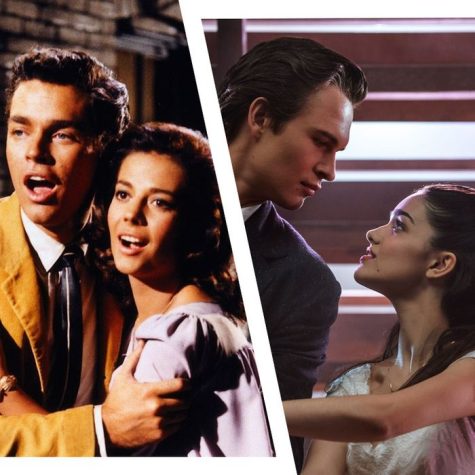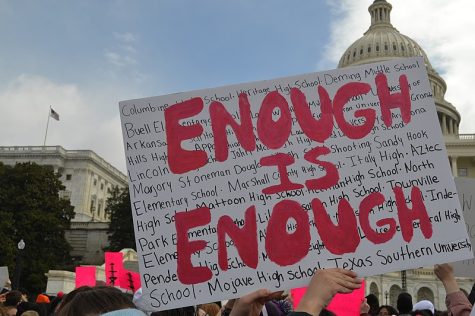Opinion: America needs to rethink its election process.
This is an opinion piece. Lindsey Ingrey is a senior at Mendham who writes for Global & Domestic News. All are opinions expressed in the following editorial are her own and do not necessarily reflect views of The Patriot.
The United States has a democracy problem. While its citizens take pride in the freedom living in the US
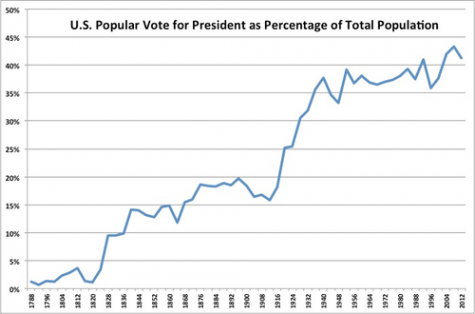
The graph shows the percentage of the US population that participated in elections.
affords, they often fail to exercise the civil rights they fought so hard to obtain. (While the graph of total voter participation seems to display an extremely positive trend, most of the changes in the graph are due to changes in voting restriction laws, namely the Fifteenth and Nineteenth Amendments to the Constitution.) During the 2016 election, less 56% of the United States’ estimated voting-age population voted.
There are some state-level laws that encourage voter participation. The majority of US states have voter leave laws that allow working adults to take some time to vote, there are no federal laws that mandate employees should have time off to cast their ballots. (For a full list of the 30 states that give time off, check out this link.) New Jersey, for instance, has no laws requiring businesses to provide employees with time off to vote. Finding the time to vote is the largest obstacle for prospective voters. High school students have to juggle school, sports, afterschool jobs and other extracurriculars, while adults have to work around their full-time jobs. A 2010 Census Bureau survey of non-voters in the 2008 Presidential Election, the majority of respondents cited work conflicts or lack of free time as the reason they didn’t vote.
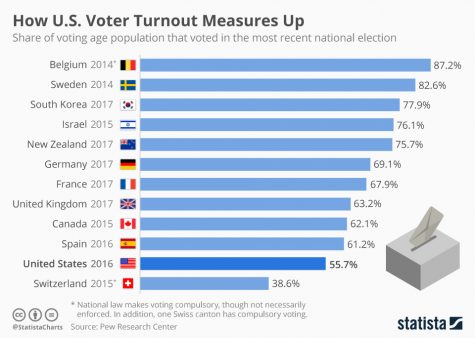
This chart displays the US’s voter turnout by percentage alongside eleven other democracies.
Other democracies don’t have the United States’ chronic voting problem. Countries like Belgium, Turkey, and Australia have taken the extreme stance of making voting mandatory. Australia fines all citizens of the voting age who fail to vote. And while Australia doesn’t have a 100% voter turnout rate, it’s 91% turn out is far higher than that of the United States (50.3%). I recognize that this strategy would be unpopular in the US as freedom of choice is enshrined in the Constitution. Establishing a national holiday or moving election day from a Tuesday to a weekend would be a healthy middle ground. Countries like Israel have found success with establishing a voting holiday (69.72% voter turn out in 2019). Other countries like Australia hold elections on weekends, which in conjunction with their voting laws, helps to boost turn out. Either of these changes ensures that all adults of voting age have the opportunity to vote, unhindered by their jobs and other responsibilities.
If the United States is to establish a Democracy Day, the change would need to come from Congress, as the President’s authority doesn’t extend to this matter. In recent years, some unsuccessful attempts have been made to pass the bill. In January 2005, Representative John Conyers, a Democrat from Michigan, proposed a bill that would establish a national holiday for elections. The bill would have made the first Tuesday of the first full week of November a legal public holiday in every even-numbered year. It was hoped that the bill would increase voter participation and change Americans’ attitudes towards voting by raising awareness for the importance of voting and civic participation. While the Democracy Day Bill initially gained a lot of traction, with 110 co-sponsors, it ultimately lapsed. It was reintroduced in May of 2005 by Senator Debbie Stabenow (D-MI) and was co-sponsored by Senators Mary Landrieu (D-LA) and Carl Levin (D-MI). The proposal never left the Senate Judiciary Committee. More recently, in 2014 and 2018, the bill was re-re-introduced by Senator Bernie Sanders (I-VT). To this day, the bill has never been enacted.
If the Democracy Day fails to pass congress, the US should at least consider changing Voting Day from the first Tuesday in November to a weekend, so as not to conflict with most people’s work schedules. According to the Pew Research Center, the United States is one of only nine nations in the thirty-six nation Organization for Economic Cooperation and Development (OPEC) that votes on a weekday or hasn’t established a national holiday for voting.
Whether the United States finally chooses to pass the Democracy Day bill or goes some alternate route, it is clear that our country’s attitude towards the voting process needs to change. The 2020 election is looming on the horizon. It’s likely that nothing in our voting laws will change between now and then, so it becomes our responsibility as US citizens to vote and encourage others to do the same. As President Barack Obama reminded voters at an October 2018 rally in Nevada, “The consequences of anybody here, not turning out and doing everything you can to get your friends, neighbors, family to turn out, the consequences of you staying home would be profoundly dangerous to this country, to our democracy.” Until Democracy Day or compulsory voting becomes a reality in the US, we would do well to remember that voting for our government is a privilege not granted to all citizens by all governments.
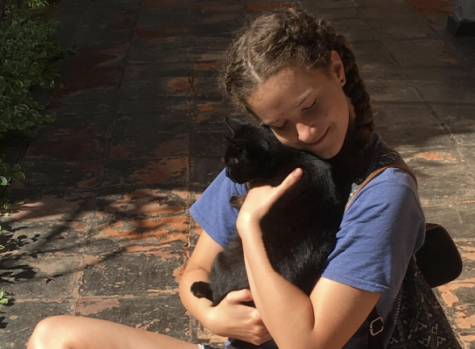
Lindsey is in the twelfth grade at West Morris Mendham High School. She is currently a member of the Girls' Cross Country Team and the Swim Team and participates...




